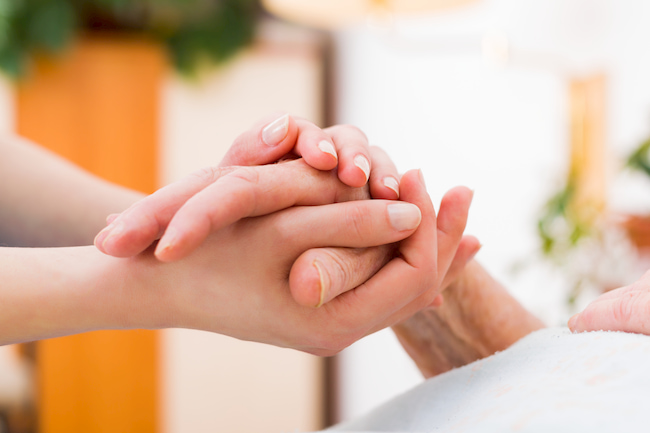No one is born alone, and in a perfect world no one would ever die alone. Unfortunately, due to a variety of circumstances, periodically a patient will come to the end of his or her life without any family or close friends to be with during the final hours of life. Recognizing the need for patients to have someone with them during the transition, Sandra Clarke, RN, CCRN, established the first No One Dies Alone (NODA) program at Sacred Heart Medical Center in Eugene, Oregon, in November 2001. The idea stemmed from a patient who died alone one night in 1986 while Sandra was working in the ICU. Once Sandra had the program at her own hospital up and running, she began to educate others on how to start their own NODA programs.
Fortunately for Erlanger, Dave Moynan, MSN, BA, RN, OCN, Nurse Director of Oncology and Nephrology Services, was familiar with NODA and recognized the need for the program at Erlanger. Dave worked with Katharine Howe Toledano, M.Div., M.Arch., BCC, from Erlanger’s Spiritual Care Office and with Emilia Pastina Jones, Director of Volunteer Services, to launch the program in 2016 here at Erlanger. Additionally, Dave and Katharine provided all the necessary training for the NODA volunteers. Marilyn Vincent, with Erlanger Volunteer services, coordinates all the volunteers and ensures that once a vigil has begun, a volunteer is scheduled to be with the patient. For her work with NODA, Marilyn has been recognized by the Tennessee Hospital Association with the 2017 Tennessee Hospital Association’s Meritorious Service Award for an Individual Volunteer. Currently, there are 68 people who are on the volunteer list for the Erlanger NODA program.
The Erlanger NODA program is available for patients who are on comfort care status, have a “do not resuscitate” order, and are expected to pass away within 48 to72 hours. NODA should be activated if the above criteria are met and the patient has no local family or friends, has no involved family or friends locally, or if the family and friends who are present need respite. The person identifying the need for NODA activation notifies the clinical nurse leader (or other nursing leadership) who, in turn, notifies the on-call chaplain at pager 6000. The on-call chaplain is always in house and is available 24/7/365. The chaplain will then work with Volunteer Services to schedule the volunteers. There is also a “Comfort Bag” that will be brought to the patient’s room for use by the patient and volunteer. The comfort bag contains a CD player and CDs to play soothing music of the patient’s choice, journals, religious materials such as a Bible and other books, a blanket or prayer shawl, and cards for the volunteers to write notes to the family. The on-call chaplain remains available for the patient and the volunteer and can be contacted at any time for any spiritual needs.
In the words of Mother Teresa, “No one should die alone. Each human should die with the sight of a loving face.” This can now become a reality at Erlanger thanks to nursing, chaplains, and especially to the volunteers who provide companionship to patients who are actively dying and are truly alone. Being physically present during the dying process affords the patient respect and dignity at the end of life.
Additional information on the NODA program can be found on Sacred Heart’s website.
If you are someone you know is interested in becoming a volunteer for NODA, please reach out to Emilia Jones at Emilia.Jones@erlanger.org.
The on-call, in-house chaplain can be reached by dialing the hospital operator and asking that the chaplain be paged, or by paging the chaplain directly on pager 6000.







